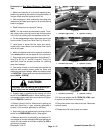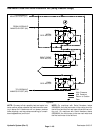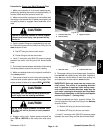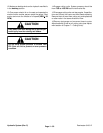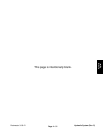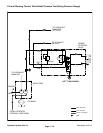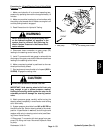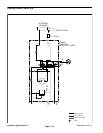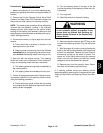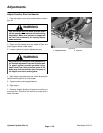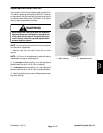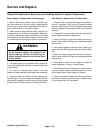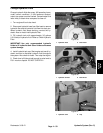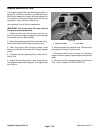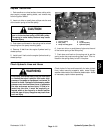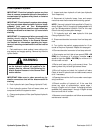
Reelmaster 3100−D Hydraulic System (Rev. C)
Page 4 − 55
Procedure for Steering Control Valve
Test:
1. Make sure hydraulic oil is at normal operating tem-
perature by operating the machine for approximately 10
minutes.
2. Perform the Lift and Steering Control Valve Relief
Pressure and Gear Pump (P2) Flow tests to make sure
that pump and relief valve are functioning correctly.
NOTE: This steering test procedure will be affected by
incorrect rear tire pressure, binding in the hydraulic
steering cylinder, extra weight on the vehicle, and/or
binding of the steering fork assembly. Make sure that
these items are checked before proceeding with any hy-
draulic testing procedure.
3. Drive machine slowly in a figure eight on a flat level
surface.
A. There should be no shaking or vibration in the
steering wheel or rear wheel.
B. Steering wheel movements should be followed
immediately by a corresponding rear wheel move-
ment without the steering wheel continuing to turn.
4. Stop unit with the engine running. Turn steering
wheel with small quick movements in both directions.
Let go of the steering wheel after each movement.
A. The steering wheel must go back immediately to
the neutral position.
B. The steering wheel should not continue to turn.
5. If either of these performance tests indicate a steer-
ing problem, determine if the steering cylinder is faulty
using the following procedure.
A. Park machine on a level surface with the cutting
units lowered and off. Make sure engine is off and the
parking brake is engaged.
B. Turn the steering wheel all the way to the left
(counterclockwise) so the steering cylinder rod is ful-
ly extended.
C. Turn engine off.
D. Read Precautions for Hydraulic Testing.
WARNING
Before disconnecting or performing any work
on the hydraulic system, all pressure in the
system must be relieved. See Relieving Hy-
draulic System Pressure in the General Infor-
mation section.
E. Remove hydraulic hose from the 90
o
fitting on the
rod end of the steering cylinder. Plug the end of the
hose.
F. With the engine off, continue turning the steering
wheel to the left (counterclockwise) with the steering
cylinder fully extended. Observe the open fitting on
the steering cylinder as the wheel is turned. If oil
comes out of the fitting while turning the steering
wheel to the left, the steering cylinder has internal
leakage and must be repaired or replaced.
G. Remove plug from the hydraulic hose. Recon-
nect hose to the steering cylinder fitting.
6. If steering problem exists and steering cylinder
tested acceptably, steering control requires service (see
Steering Control Valve and Steering Control Valve Ser-
vice).
Hydraulic
System



